How Dr. Bronner's grew to $170M in revenue under a Cosmic Engagement Officer
Or, why Dr. Bronner's is the original B Corp
👋 Hi, I'm Amanda. I'm a brand strategist and fractional CMO. I help founder-led businesses turn belief into brand—and brand into a strategic asset that works as hard as you do. I share weekly deep dives with actionable advice on brand building—plus interviews with the people in the trenches. I also work 1:1 with founders and teams. Book a chat here.
👋 Good morning. I can’t wait to share today’s case study with you. I have one conclusion: Dr. Bronner’s is the original ethical company.
➡️ This will inspire you if you’re a B2C business: investing in mission-driven brand advocacy, a LinkedIn warrior beating the #brandpurpose drum, or you’re building a founder-led brand.
Today
If you’ve ever taken a mid-shower moment to read the loquacious label on a Dr. Bronner’s bottle, you’ll have noticed that it’s not your average soap company. Notably:
📈 It’s grown 372% in total revenue over 13 years
🚨 Its CEO (that’s Cosmic Engagement Officer) who’s been arrested in front of the White House after locking himself in a cage during a hemp protest
🍄 It funds a 24/7 hotline for people having bad psychedelic trips
This is the story of Dr. Bronner’s Magic Soaps. Join me down the rabbit hole. 🍄
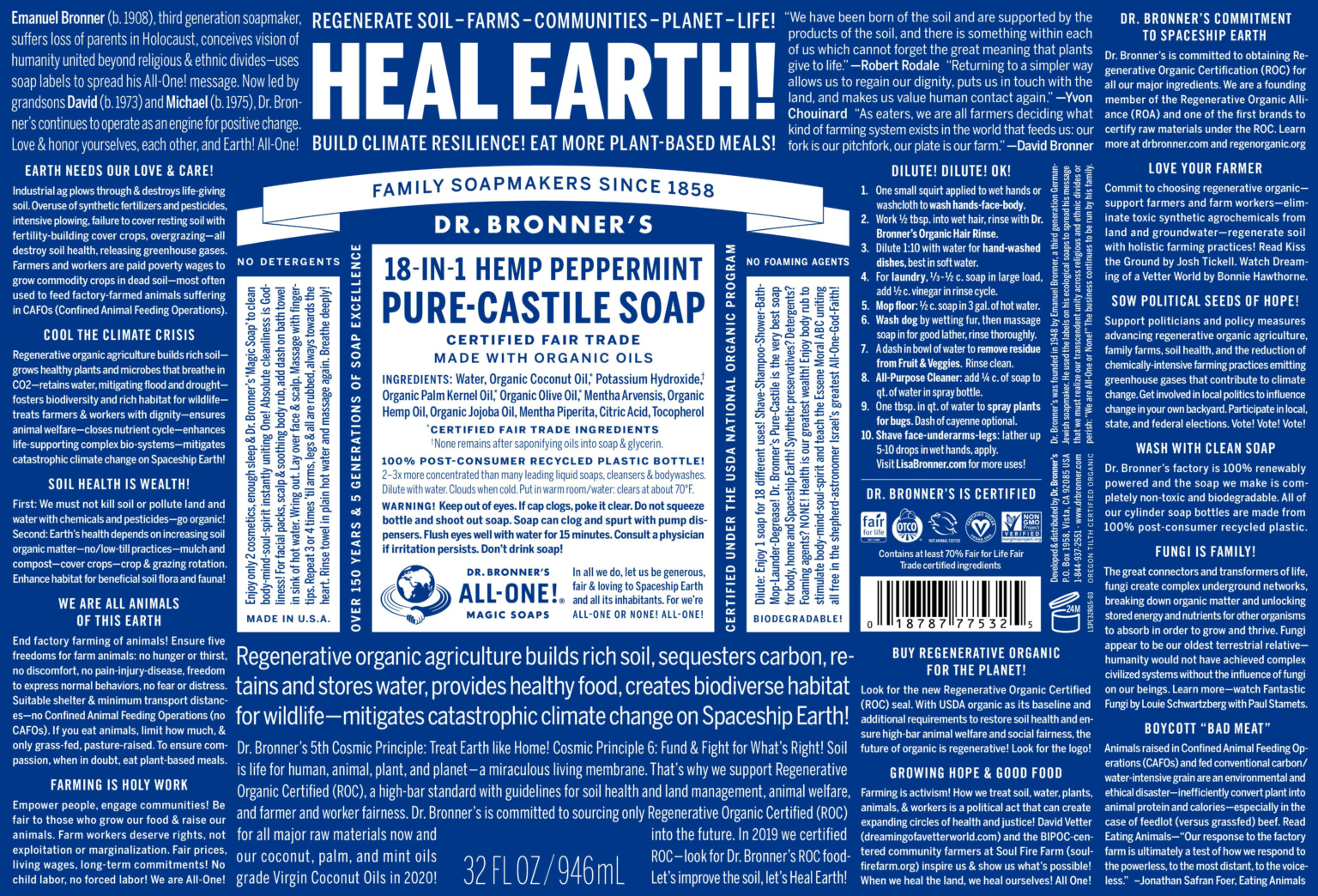
What! Made! Dr. Bronners! Such! A! Successful! Brand!
The strongest brands I can think of are belief systems. Not only a proposition: they have a founding myth, a world, causes they care about and fight for, and ways for other people to participate in that belief beyond buying their product. Here’s how Dr. Bronner’s builds their belief system:
Clarity of purpose
Clarity of purpose often goes hand in hand with a visionary founder. Dr. Bronner’s founding lore is a truth that is stranger than fiction.
Our hero: Emanuel Bronner, German-American immigrant, master soapmaking certificate in hand. He immigrates to America in 1929. Shortly after the Holocaust, where he loses his parents, he starts preaching the All-One! message, calling for unity and equality under one god across all religions. He is thrown in an insane asylum. He breaks out not once, not twice, but three times, hitchhikes to Las Vegas, gambles his last dollars, and pays his way to L.A. where he started his soap company in 1948.
I’d buy that script. But that’s not the end of the story.
Emanuel realizes that people aren’t listening to his lectures, so he publishes his teachings on soap labels and gives them away. The soap was simply the vehicle for the message, which brings us to…
Doubling down on that iconic packaging
Dr. Bronner’s packaging has remained eerily similar over the years. In life, wearing the same outfit every day is weird. In brand land, they call that a distinctive asset, a hallmark. Distinctive assets can be:
visual (ex: golden arches)
verbal (ex: I’m loving it)
auditory (ex: the five note intonation before ‘I’m loving it’).
In this case, our distinctive asset is visual: it flies in the face of good design principles. In the case of Dr. Bronner’s? It works. And what really works? They’ve maintained it for 50 years.
“What focus group or marketing agency would ever come up with it?” Michael Bronner, on Dr. Bronner’s label
They put their money where their mouth is
In CFO speak they’re willing to make a financial investment in brand building. You can tell what a company cares about by looking at their balance sheet. From giving away soap to get their beliefs out into the world to donating $3.9M to drug policy reform, Dr. Bronner’s walks the talk.
Their brand principles have teeth
At worst, company values are an exercise in generating feel-good aphorisms (customer centricity! act like an owner!). At best, they’re shorthand for decision making. Dr. Bronner’s 6 Cosmic Principles underpin what might be the most progressive pay policy of any American company: Dr. Bronner’s caps executive pay at a 5:1 ratio and pays a starting wage of $26/hour. For employees, they’ll cover ketamine therapy, childcare, and reimbursement for travel costs for healthcare not provided in your state.
Should Dr. Bronner’s…run for office? I digress.
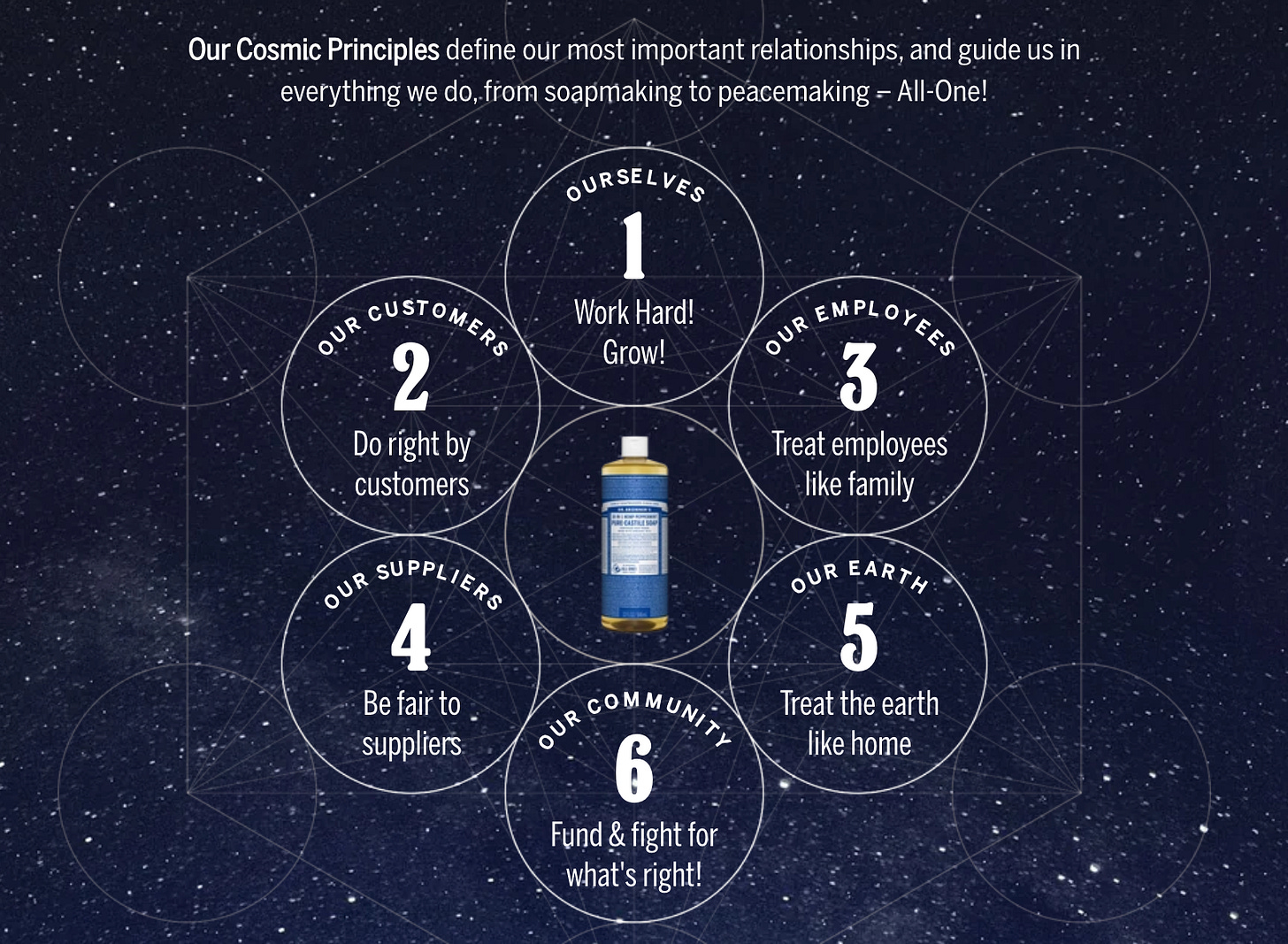
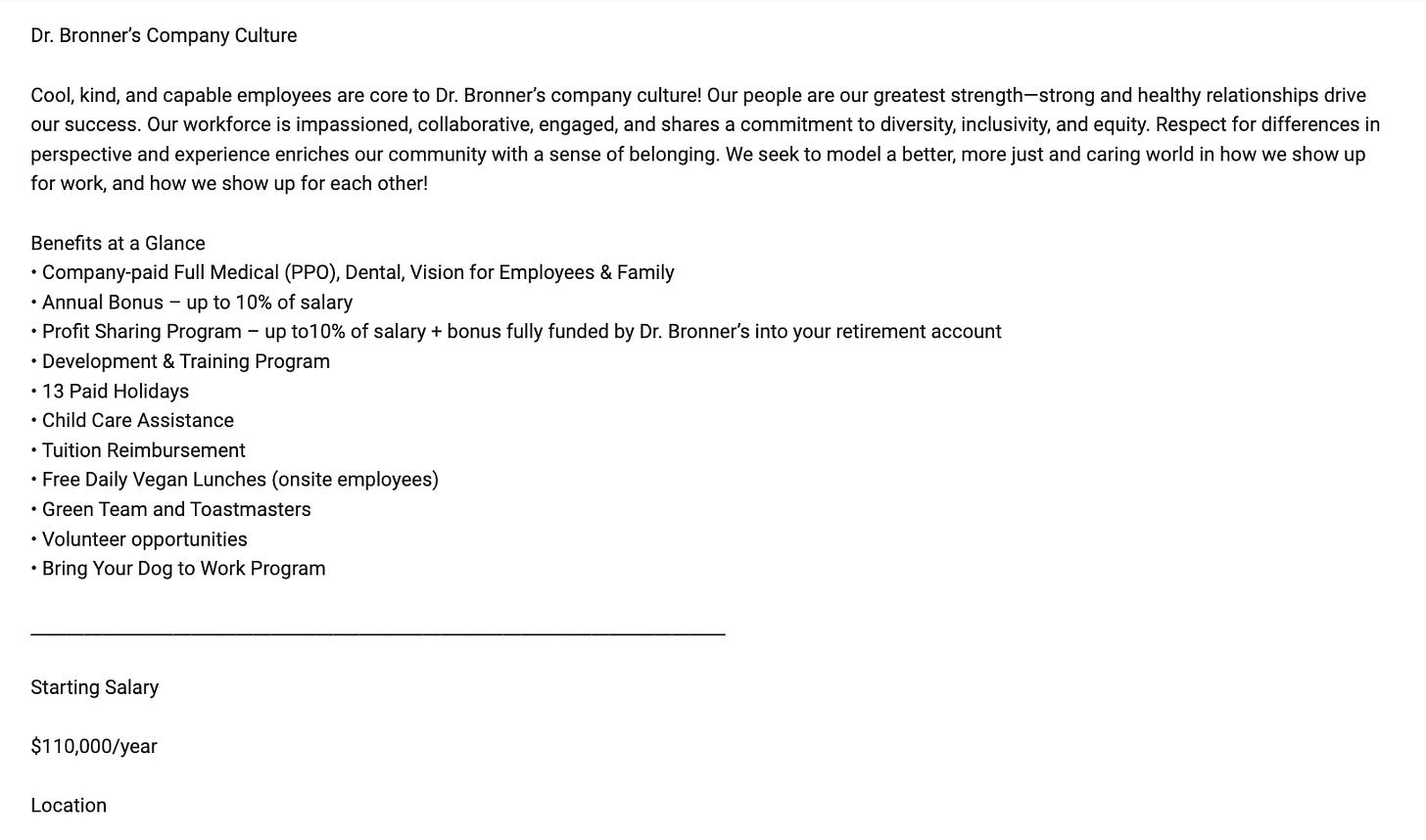
Mission driven brand activism (aka, they walk the talk)
One of the most interesting things Dr. Bronner’s does is invest in the change they want to see. They fund a 24/7 hotline for people having bad psychedelic trips. Their CEO has been arrested in front of the White House at a hemp protest. They are one of the country’s biggest financial supporters of efforts to win mainstream support for psychedelics. It’s very easy to understand what Dr. Bronner’s stand for: therefore, easier to care about them.
“If you stand for something, you will always find some people for you and some against you. If you stand for nothing, you will find nobody against you, and nobody for you.” - Bill Bernbach.
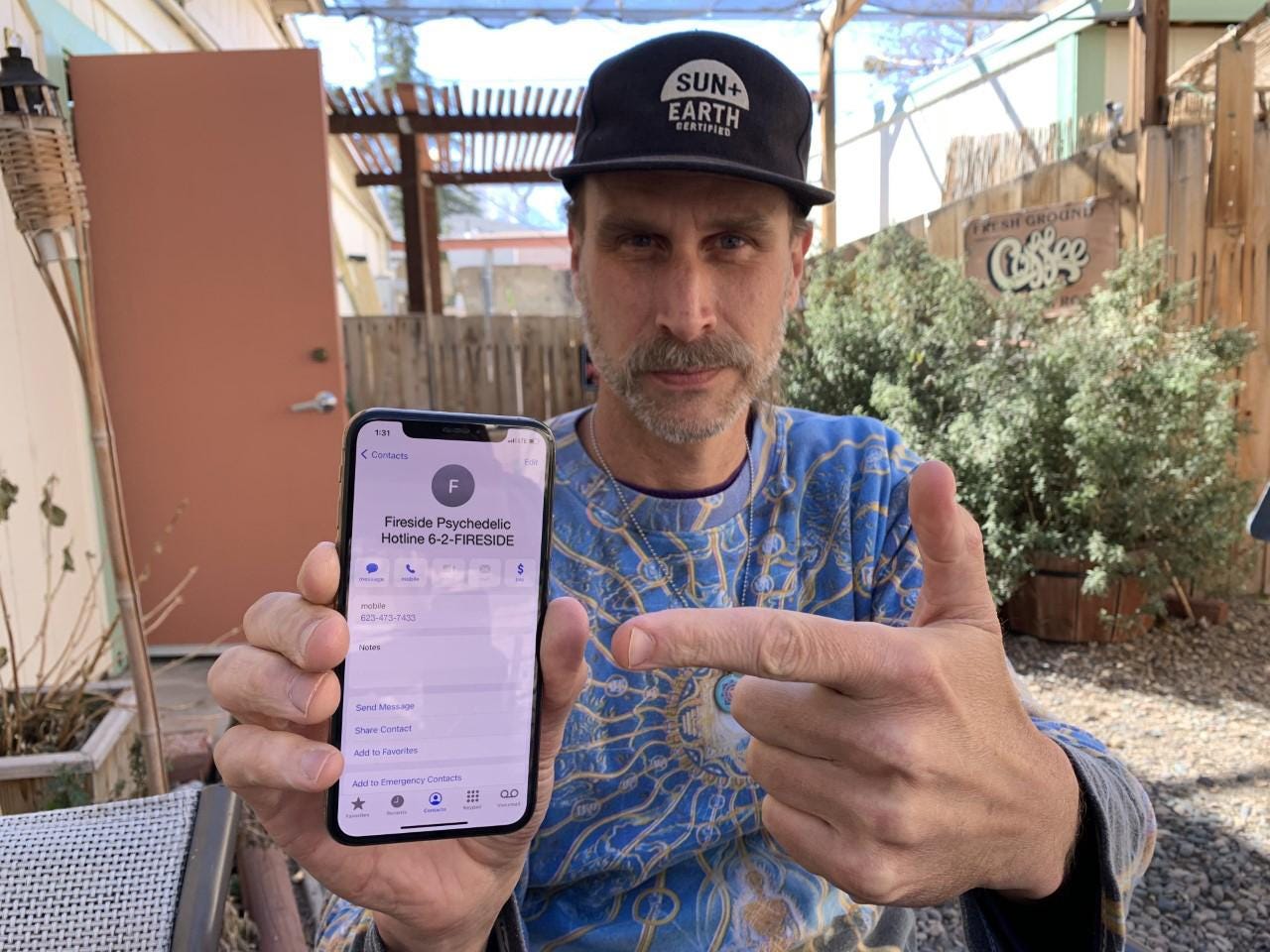
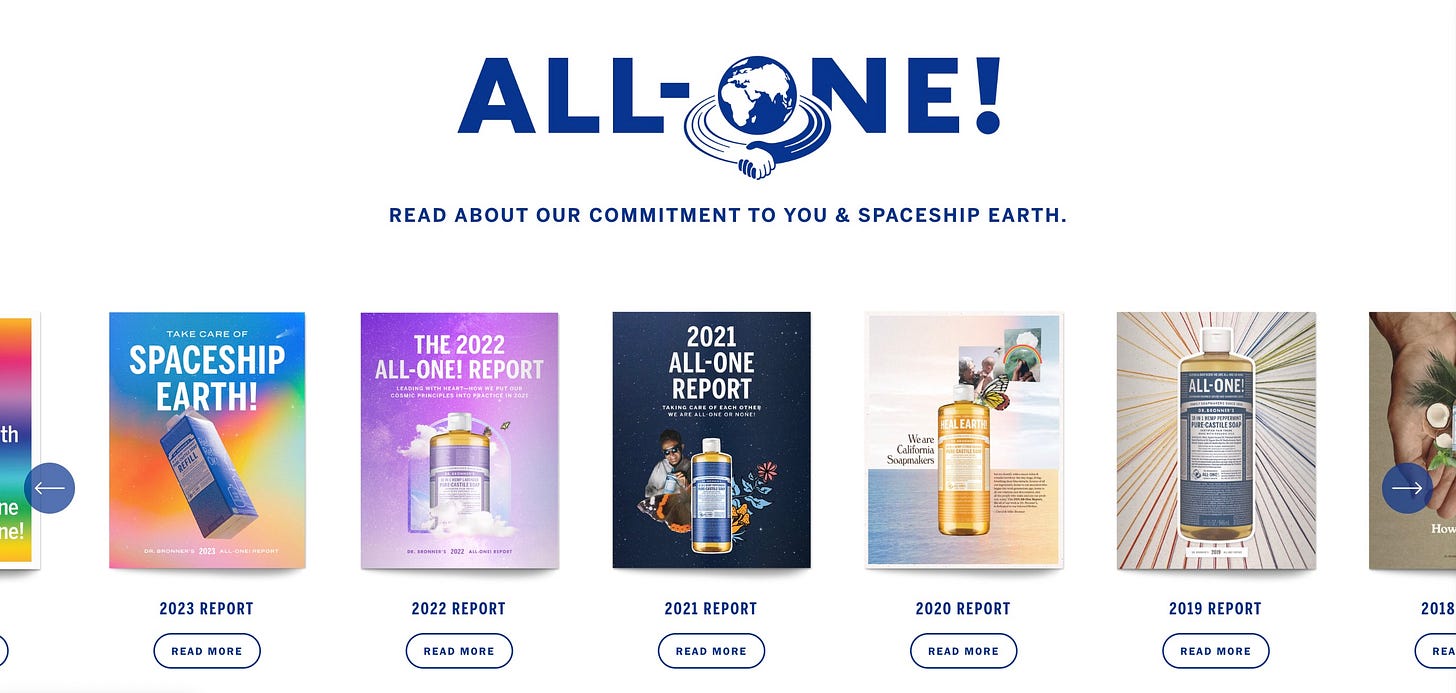
In the wake of the one-for-one model (Toms, Warby Parker, I’m looking at you), it’s sort of refreshing that Dr. Bronner’s doesn’t hit you over the head with their advocacy or try to turn it into an ad. There’s a quiet confidence to it. It’s just part of who they are.
Tactics to love & learn from:
Three takeaways:
🙌 There’s power in being explicit about what you believe. This isn’t a brand that’s crushing tear-jerking ads, like Frida, or building a tiered community experience, like Tracksmith. It’s just soap. But Dr. Bronner’s real work? Living up to what they say on the tin. Ask yourself: Do you know what you stand for? Would you be willing to put it on your label?
✊ Never forget: strong brands are built from the inside out. When I worked in-house at an activist pension fund, my first brand act was commissioning headshots of staff that cast them as the activists they were. The culture became, well, a little culty. But it was immediately clear to new employees what was important, why the organization did what it did, and how to contribute. Ask yourself: What do we do around here that’s different from other places?
👯 Consistency is always in style. Dr. Bronner’s packaging has remained relatively unchanged from 1972 onwards. Dr. Bronner’s label shouldn’t work. But it does. It’s entertaining, it’s true, and it still stands out on shelf - 70 years later. Ask yourself: What’s true now that shouldn’t change? Or What was true when we began, that still serves as a North Star today?
Next time: We’re looking at a brand that’d make your dad proud. Make sure you’re signed up so you don’t miss it.
👋 Til next week,
Amanda
What did you think of this newsletter?









